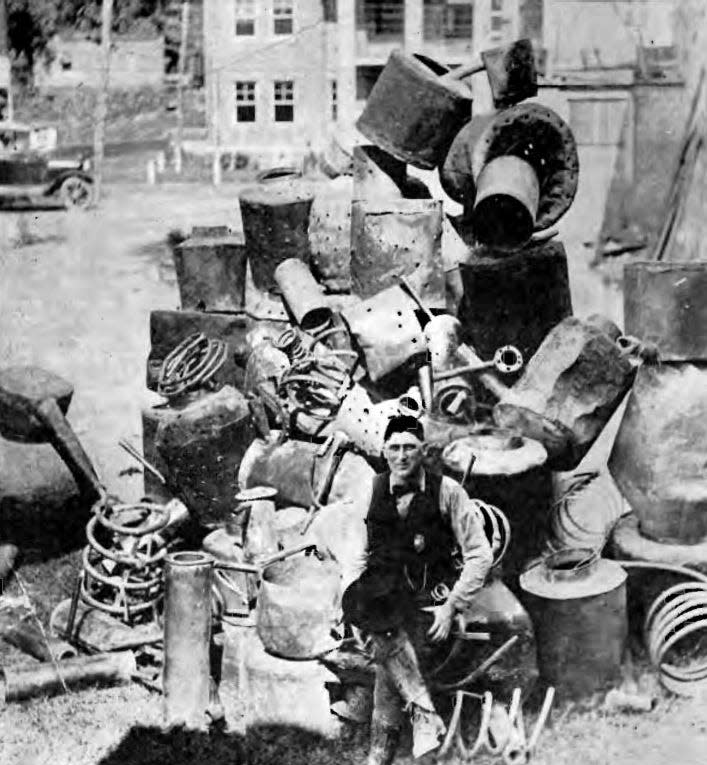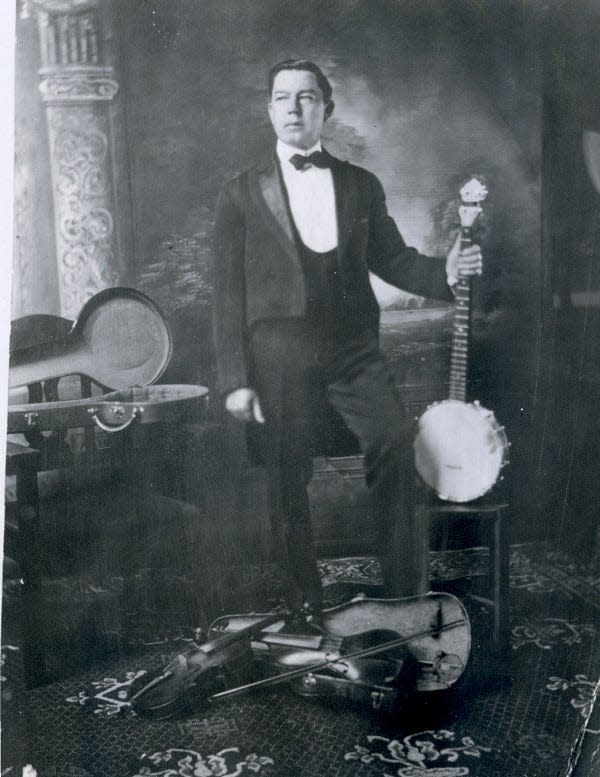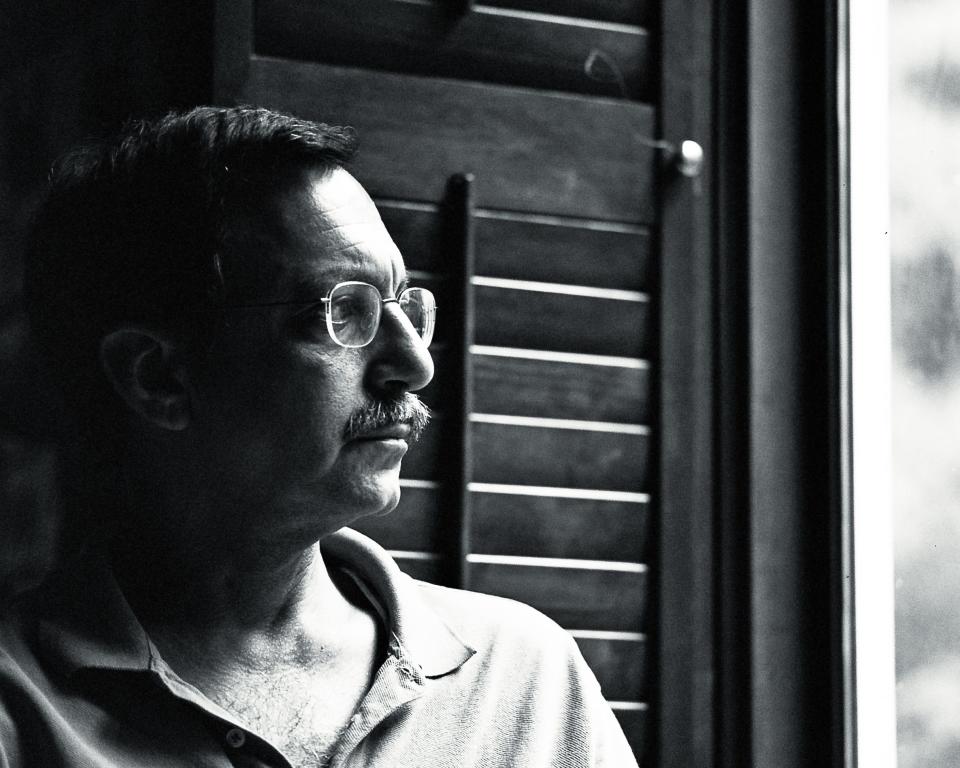Visiting Our Past: Classic 'Mountain Dew' has roots in Bascom Lamar Lunsford's life in WNC

- Oops!Something went wrong.Please try again later.
A born music-maker needs to hear his pockets jingle. Such was the case with Bascom Lamar Lunsford, Mars Hill's "minstrel of the Appalachians," who, in his 20s, solicited honey from bees and judges with pleas while developing his historic role as traditional mountain music's greatest organizer.
Mars Hill College's Lunsford Festival (editor's note: The 2022 festival is scheduled for Oct. 8) honors the musician's legacy with a premiere showcase of a wide range of traditional performers. The college is also the site of the Lunsford archive, which documents, among other things, how Lunsford went about collecting the pure cultural product.
As a beekeeper, he swapped songs with the people who let him use their property to set up his hives. As a teacher, he got the idea of holding contests for students who submitted the best ballads. As a solicitor in Morganton in the late 1910s, he picked up material for original songs, most notably "Mountain Dew."
"On my first day in court I wish to report," Lunsford's song begins. It then shifts to the defendant, who confesses to selling moonshine — "mountain dew "— to deacons, doctors, and train conductors.
The defendant concludes, "My attorney began to turn the lid on the can. / I knew then my case was lost. / Said His Honor to me, / I'll set you free if you will pay the cost."
Lunsford's grandson, Ed Herron of Hickory, recently went to the Burke County courthouse to research his grandfather's legal career. "I pored over quite a bit of cases," he says, "and found one — there was no mention of who the solicitor was — about a fellow who'd been tried for peddling spiritous liquors" a few years after Bascom had gotten his license from Trinity College law school.
On Feb. 22, 1917, a trial judge ruled that the defendant "proved a good character by a number of the best citizens of Morganton ... (and) it is the judgment of the Court that the defendant ... pay a fine of thirty dollars," and be discharged.
"For they call it that Old Mountain Dew / And those who refuse it are few. / But," says the judge in the song, "you acted the man when you took that stand / To swear what is so true."

The court record notes that the defendant had in his possession, for the purpose of sale, two gallons of the illegal substance, "not being a druggist or medical depository duly himself." Lunsford's criminal sings, "The deacon drove by in his auto so shy, / said his family was down with the flu." In fact, ailing persons could get their medicine direct from the sheriff, as is revealed in Mars Hill College's collection of material relating to Sheriff Jesse James Bailey.
"Sir — John Sprinkle is very sick," a prescription from Bailey's collection reads, "and I have advised him to use whiskey. If this is legitimate, consider me as prescribing for him as often as he sends for it."
Lunsford knew his stuff. "During his peregrinations," writes John Angus McLeod in his interpretive biography, "he not only gained rapport with balladeers but also became acquainted with illicit distillers and their modus operandi." Defending two young men in McDowell County once, he questioned them about backings, low wine, and proof vial.
"The prosecuting attorney told Mr. Lunsford that if he did not desist from using such language, the court would put him under the jailhouse on suspicion."
"Low wine," Lunsford writes in his memoir, "It Used to Be," "is what is left after the first is run off and after they've proofed it. They proof it with a proof vial," a 7-inch long, broad-bottomed, tapered ludnum (laudanum) bottle, in which, he explains, you collect the run-off, "shake it and judge as best you can whether it's high proof or whether it's low wine ... The low wine runs on till it runs out ... They set that aside or set it back. That's also called 'backin's.'"
When Scotty Wiseman recorded "Mountain Dew" with Lulu Belle in 1945 — with Lunsford's collaboration and sale of the copyright in exchange for train fare — he changed a lot of the words. The verse about the tippling train conductor was out. Added was one about "old Uncle Mort ... sawed off and short" who "thinks he's a giant when he gets him a pint."
The song became much more commercial. Thus its adoption by Pepsi Company for the soft drink it had bought from Independent Bottlers. "Mountain Dew" became part of a commercial jingle for a short while, until, Herron says, his granddaddy sued them to quit or pay. They quit.
Nonetheless, all kinds of other people have kept adding to the song. When a boy, Herron had heard his grandfather remark "how pleased and proud he was that it had become a true living song, (that) the public had taken it on as their own."

Rob Neufeld wrote the weekly local history feature, "Visiting Our Past," for the Citizen Times until his death in 2019. This column originally was published Oct. 1, 2008.
This article originally appeared on Asheville Citizen Times: Visiting Our Past: 'Mountain Dew' has roots in Lunsford's life in WNC

